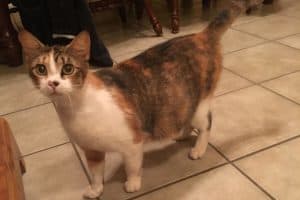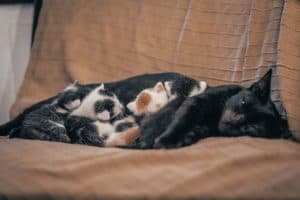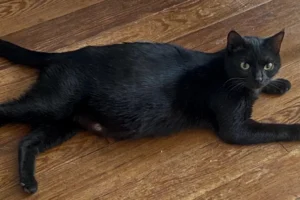Cats are known for their independent nature and mysterious ways. One interesting question that cat owners may find themselves pondering is, “Why do cats give birth early?” This natural phenomenon may seem puzzling at first, but there are several reasons behind it.
Cats, like many other animals, give birth early as a survival instinct.
Early Signs of Pregnancy in Cats
If you suspect that your precious feline friend may be expecting, keep an eye out for some early subtle signs of pregnancy. Changes in appetite can be one of the first indicators, with your cat either eating more or less than usual. Additionally, increased affection towards you or seeking out warm, cozy spots to rest can also be a sign that something special is on the way.
Another common early sign is nipple growth and color change. This occurs as the cat’s body prepares for nursing her future kittens. Morning sickness is not just for humans – cats can also experience this during the early stages of pregnancy, leading to vomiting or lethargy. Keep an eye out for any of these signs to stay ahead of your cat’s pregnancy journey.
For more detailed information, you can check out this resource on early signs of pregnancy in cats.
Instinctual Behavior During Pregnancy
As your cat’s pregnancy progresses, you may notice some instinctual behaviors kicking in as she prepares for birth. Nesting behavior is common, where your cat will start to create a cozy, safe space for her upcoming litter. This could involve gathering soft materials like blankets or towels to make a comfortable nest for her kittens.
Another instinctual behavior is increased grooming. Pregnant cats may spend more time grooming themselves to ensure they are clean and ready for birth. Keep an eye out for restlessness or pacing, as your cat may start to feel anxious or uncomfortable as the birth approaches. Increased vocalization can also be a sign that labor is near, as your cat communicates her needs and discomfort.
Remember to provide your pregnant cat with plenty of love, care, and a quiet space to give birth comfortably.
Factors Influencing Early Birth
Cats can give birth early due to various factors such as infections, hormonal imbalances, genetic predisposition, stress, or a crowded uterus. Infections like feline herpesvirus or feline leukemia can trigger premature labor. Hormonal imbalances, such as low progesterone levels, can also lead to early labor. Genetic factors may play a role, especially in breeds prone to premature birth. Stressful environments or sudden changes can cause a cat to go into labor early. Additionally, when a cat is carrying a large litter, there might not be enough space in the uterus for all the kittens to reach full term, resulting in premature birth.
Raising Kittens Born Early
When caring for kittens born early, extra attention and care are crucial. Premature kittens are often smaller and weaker than full-term kittens, requiring special care to survive. Keep them warm with a heating pad set to a low temperature or snuggle them close to your body for warmth. Ensure they are feeding properly by bottle-feeding them every 2-3 hours with a kitten-specific formula. Monitor their weight gain to track their development and consult a veterinarian if you notice any concerning symptoms. Creating a quiet and stress-free environment is essential for their growth and wellbeing.
Additional Unique Insight:
- Provide a Nesting Box: Creating a cozy nesting box with blankets or towels can simulate the warmth and security of a mother cat, helping premature kittens feel safe and comfortable.
For more information on caring for premature kittens, you can visit The American Association of Feline Practitioners for expert advice and resources.
Health Risks for Mom and Kittens
Premature birth in cats can pose serious health risks for both the mother cat and her kittens. The mother may experience complications during labor, such as difficulty expelling the kittens or potential uterine infections. These complications can be life-threatening if not addressed promptly by a veterinarian. The kittens born prematurely are also at risk of various health issues, including underdeveloped organs, low birth weight, and a weakened immune system. This can lead to a higher mortality rate among premature kittens compared to full-term ones.
Seeking Veterinary Care
It is crucial to seek immediate veterinary care if you suspect your cat is going into labor early. A veterinarian can evaluate the mother cat’s condition, provide necessary medical interventions during labor, and monitor the health of the premature kittens. Prompt veterinary attention can help minimize health risks for both the mother and her kittens and increase the chances of a successful outcome. Remember, early intervention is key to ensuring the well-being of your cat and her offspring.
- Keep a close eye on your cat if you notice any signs of premature labor, such as nesting behavior, restlessness, or vaginal discharge.
- Prepare a comfortable and quiet space for your cat to give birth, and provide her with easy access to food, water, and a litter box.
- Monitor the progress of labor and contact your veterinarian immediately if you have any concerns about the mother cat or her kittens’ health.
- Follow your veterinarian’s postnatal care instructions to ensure the ongoing health and development of the kittens.
For more information on feline pregnancy and childbirth, you can visit the American Society for the Prevention of Cruelty to Animals (ASPCA) website at ASPCA Cat Care.
Long-term Effects on Kittens
Being born early can have long-term effects on kittens, impacting their development and health. Prematurely born kittens may struggle with weaker immune systems, making them more susceptible to illnesses throughout their lives. Additionally, they may face growth and developmental challenges, leading to potential behavioral issues as they age. It is crucial to provide extra care and attention to premature kittens to ensure they have the best chance at a healthy and happy life.
Fun Facts About Cats and Pregnancy
Did you know that a cat’s pregnancy typically lasts around 9 weeks? That’s just a little over two months before those adorable kittens make their debut into the world. Cats are also known for their incredible ability to give birth to multiple kittens in a single litter, with some litters ranging from 1 to 9 kittens, depending on the breed. Another interesting fact is that mother cats create a special bond with their kittens through grooming and snuggling, helping to foster a strong relationship from the very beginning. Cats truly are remarkable creatures when it comes to pregnancy and motherhood!
Additional Unique Insight: One fascinating fact about feline pregnancy is that a pregnant cat’s appetite can increase significantly as she prepares to nourish her growing kittens. It’s essential to provide her with high-quality food during this time to support her health and the development of her babies.
References: Cat Pregnancy: How to Help Your Pregnant Cat – WebMD
Alex, a passionate animal lover, has experience in training and understanding animal behavior. As a proud pet parent to two dogs and three cats, he founded AnimalReport.net to share insights from animal experts and expand his knowledge of the animal kingdom.




